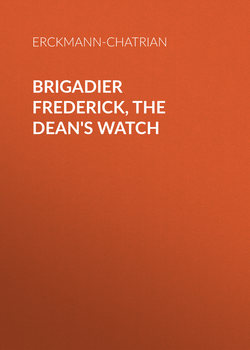Brigadier Frederick, The Dean's Watch

Реклама. ООО «ЛитРес», ИНН: 7719571260.
Оглавление
Erckmann-Chatrian. Brigadier Frederick, The Dean's Watch
ERCKMANN-CHATRIAN
BIOGRAPHICAL NOTE
BRIGADIER FREDERICK
I
II
III
IV
V
VI
VII
VIII
IX
X
XI
XII
XIII
XIV
XV
XVI
XVII
XVIII
XIX
XX
XXI
XXII
XXIII
XXIV
XXV
XXVI
XXVII
XXVIII
XXIX
XXX
XXXI
XXXII
XXXIII
XXXIV
XXXV
XXXVI
XXXVII
XXXVIII
XXXIX
XL
THE DEAN'S WATCH
I
II
THE PORTRAITS OF ERCKMANN AND CHATRIAN
Отрывок из книги
The celebrated friends who collaborated for fifty years under the title of ERCKMANN-CHATRIAN were natives of the department of the Meurthe, in Alsace-Lorraine. ÉMILE ERCKMANN was born at Phalsbourg (now Pfalzburg), on the 20th of May, 1822. His father was a bookseller; his mother he lost early. He was educated at the grammar school of Phalsbourg, and was a boarder there, growing up an intractable and idle boy. At the age of twenty Erckmann went up to Paris to study law, but he was inattentive to his work, and positively took fifteen years to pass the necessary examinations; having done so, he made no further rise of his profession. When he was twenty-five he suffered from a serious illness, and during his convalescence, in Alsace, he turned his attention to literature. At this moment there had arrived in Phalsbourg; as an usher in the grammar school, a young Alsatian, ALEXANDRE CHATRIAN, of Italian descent, who was born at Soldatenthal, near Abreschwiller, on the 18th of December, 1826, and who was destined for the trade of glass-worker. He had been sent in 1844, as an apprentice, to the glass-works in Belgium, but had, in opposition to the wish of his parents, determined to return and to be a schoolmaster in France.
Erckmann and Chatrian now met, and instantly felt irresistibly drawn to one another. From this time until near the end of their careers their names were melted indissolubly into one. In 1848 a local newspaper, "Le Démocrate du Rhin," opened its columns to their contributions, and they began to publish novels. Their first great success was "L'Illustre Docteur Mathéus" in 1859, which appeared originally in the "Revue Nouvelle," and which exactly gauged the taste of the general public. This was followed by "Contes Fantastiques" and "Contes de la Montague," in 1860; by "Maître Daniel Rock," in 1861; by "Contes des Bords du Rhin" and "Le Fou Yégof" in 1862; "Le Joueur de Clarinette" in 1863; and in 1864, which was perhaps the culminating year of the talent of Erckmann-Chatrian, by "Madame Thérèse," "L'Ami Fritz" and "L'Histoire d'un Conscrit de 1813." These, and innumerable stories which followed them, dealt almost entirely with scenes of country life in Alsace and the neighbouring German Palatinate. The authors adopted a strong Chauvinist bias, and at the time of the Franco-German War their sympathies were violently enlisted on the side of France.
.....
"Well," said he, "here is the affair in two words: The other day Jean Merlin was so melancholy that I asked him if he was sick, and the poor fellow confessed to me, with tears in his eyes, what he called his misfortune. You are so serious and respectable-looking that none of the family dared to make the proposal, and the good people thought that I would have some influence. Must I put on my grand uniform, Father Frederick?"
"Then you consent?"
.....